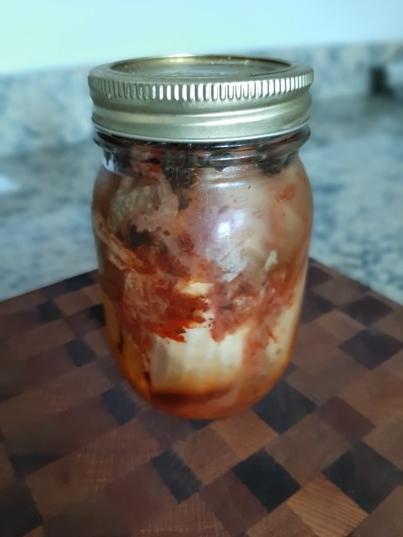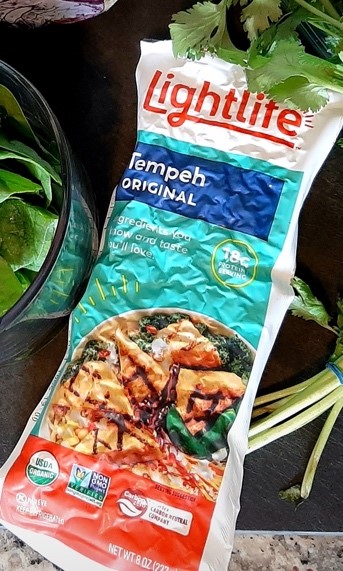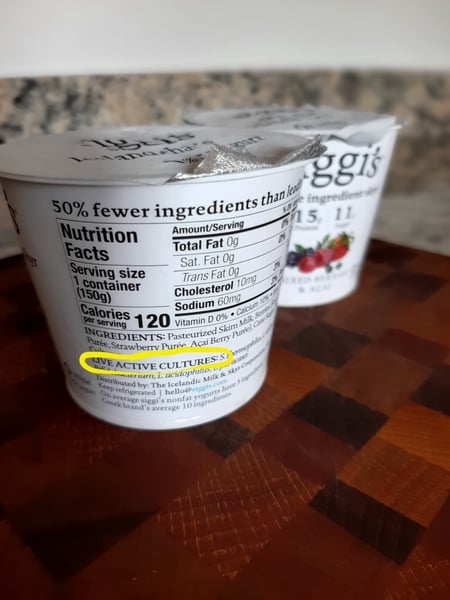
Don’t freak out. There are bugs all over you. Over 100 trillion of them. But they’re not actually bugs; they’re microbes and they do some pretty phenomenal things for us, especially the ones found in our gut. In a healthy person, this microbiome, or collection of trillions of microorganisms that coexist with one another, helps our body function smoothly and is even labeled as its own supporting organ.
Don’t believe me yet? Take vitamin K for example. Vitamin K is found in foods like leafy greens and oils and is an essential component for blood clotting, so if you get a small cut on your hand while slicing that tomato with a dull knife, vitamin K helps make sure you’re not going to continuously bleed out. And guess what? Our gut bugs can actually make vitamin K for us!
 Kimchi
Kimchi
Okay, so what does that have to do with food and The Chopping Block? Well. While we are still at just the beginning of researching the effects of the human microbiome, we do know that it’s a pretty powerful tool (influencing our immune system, breaking down toxic compounds, making vitamins and nutrients for us just to name a few). And what if I told you we could impact this powerful tool ourselves by doing one of the joyous things on the planet: eating?
 Introducing: probiotics. Probiotics are “good” bacteria found in foods and supplements that we can ingest to improve the balance of bacteria in our gut and affect our health. They work by taking up real estate in our gut that would otherwise be open to bad bacteria to take up residence. It’s when there’s an imbalance in this coexistence of “good” and “bad” bacteria that probiotics are most needed, such as reducing diarrhea after a food poisoning experience or replenishing the microbiome after a round of antibiotics. Probiotics have also been associated with improved symptoms of irritable bowel syndrome (IBS), constipation, and even may be linked to anxiety, cholesterol levels, blood sugars, and respiratory tract infections (more consistent and high-quality research is needed though).
Introducing: probiotics. Probiotics are “good” bacteria found in foods and supplements that we can ingest to improve the balance of bacteria in our gut and affect our health. They work by taking up real estate in our gut that would otherwise be open to bad bacteria to take up residence. It’s when there’s an imbalance in this coexistence of “good” and “bad” bacteria that probiotics are most needed, such as reducing diarrhea after a food poisoning experience or replenishing the microbiome after a round of antibiotics. Probiotics have also been associated with improved symptoms of irritable bowel syndrome (IBS), constipation, and even may be linked to anxiety, cholesterol levels, blood sugars, and respiratory tract infections (more consistent and high-quality research is needed though).
Okay, so what foods are these found in? The benefits of probiotics have actually been noticed for centuries with ingestion of fermented foods such as kefir, fermented vegetables, yogurt, tempeh, green olives, wine, sourdough bread, miso, and sauerkraut. Check out some of our other blogs to read more about how to use kefir, tempeh, and even make your own fermented vegetables!
 You’ll also want to try incorporating a few prebiotics as well. If probiotics are the organism, then prebiotics are the food or energy for the organisms (so yes, food for the food we are eating). Prebiotics are carbohydrates or fibers found naturally in fruits and vegetables such as bananas, asparagus, onion, garlic, artichokes and whole grains, but we can’t digest them on our own. Probiotics however, need these sugars as their own food! Thus, when eaten together, also known as symbiotic, we are happy (because we are eating) and our bugs are happy (meaning we have better health). Join us for our Pizza on the Grill Demo on September 19th as an example of how you can deliciously eat prebiotics.
You’ll also want to try incorporating a few prebiotics as well. If probiotics are the organism, then prebiotics are the food or energy for the organisms (so yes, food for the food we are eating). Prebiotics are carbohydrates or fibers found naturally in fruits and vegetables such as bananas, asparagus, onion, garlic, artichokes and whole grains, but we can’t digest them on our own. Probiotics however, need these sugars as their own food! Thus, when eaten together, also known as symbiotic, we are happy (because we are eating) and our bugs are happy (meaning we have better health). Join us for our Pizza on the Grill Demo on September 19th as an example of how you can deliciously eat prebiotics.
You may be thinking, “I’ve seen the term “probiotic” on supplements and food product labels, should I be taking those instead?” While that’s another, future blog post in itself, for now, if you’re a healthy person, eating whole foods is not only better for your health overall, but it’s also just fine as your main source for your microbiota. Remember, supplements are a multi-billion dollar industry that isn’t regulated by the U.S. Food and Drug Administration (meaning they aren’t upheld to certain standards such as fully disclosing all the ingredients used in a product or if cultures contained in a probiotic supplement bottle are even live/viable anymore). While there are some more reliable brands out there, supplements are more effective for people with a specific condition or imbalance in their microbiome. Bottom line: enjoy the different flavors, textures, and dishes that the world has to offer to serve your health for you and those trillions of bugs that live with you.

